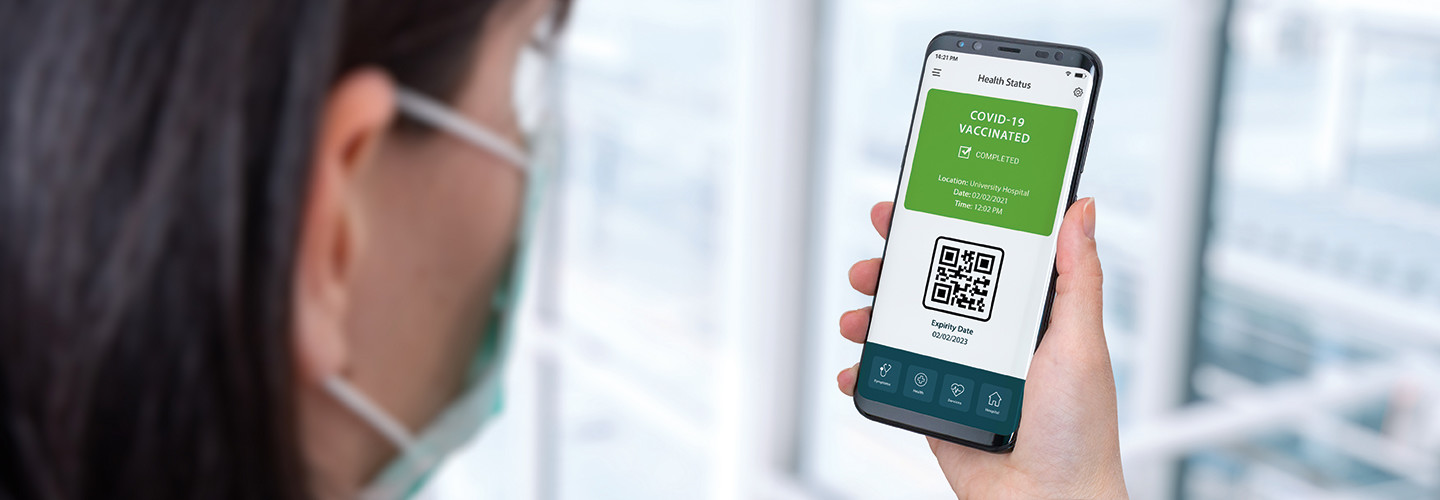Companies such as Zebra Technologies are building the hardware and software to help authenticate COVID-19 vaccine status.

Social media has seen a wave of people sharing pictures of their paper vaccination cards after getting their COVID-19 shots. But what could a digital version look like, one that people could possibly access on their smartphones?
Governments are offering guidance on the potential of a digital form for these cards. “Vaccine passports” may consist of a QR code shown in a smartphone app.
However, the move from paper card to digital space raises concerns around data privacy and accessibility. Companies such as Zebra Technologies are contending with these issues as they work to help bring digital passports to life.
Bringing EHRs into the Fold
Today’s electronic health records have data fields to enter vaccine information, says Chris Sullivan, Zebra’s global healthcare practice lead.
Patient portals also allow people access to their own data. Consumer applications can use QR codes and biometric technologies to enable data access in a safe and secure manner, he adds.
To accelerate digital authentication adoption, healthcare providers should record detailed information, such as the vaccine name, patient name, date of administration and vaccine doses, into EHRs. “Providers also need to help make this information available and shareable,” Sullivan says.
Zebra, IOTA Collaborate on Vaccine Passport Technology
Zebra has developed data management platform technologies to allow digitally captured information to be shared within distributed ledger technology platforms. One such example is the company’s blockchain collaboration with IOTA Tangle, a type of distributed ledger technology.
“It delivers synchronized data dissemination in a manner that is controllable among the persons or organizations participating in the operation of the system,” Sullivan says. “Digital distribution ledger platforms such as this can help accelerate vaccine digital passport adoption due to their tamper-proof and open-source technology attributes.”
Vaccine card issuers can use industrial printers from companies such as Zebra to print a secure smart card or label containing either a barcode or QR code. Or people can download an app containing the QR code, similar to using digital wallets. At an airport or a stadium, people would verify vaccination status by scanning their codes.
READ MORE: How IT solutions support COVID-19 vaccine supply chain logistics.
Zebra is looking for developers to create front-end software for data aggregation that can enable credentialing and verification, Alex Fryer, regional product manager, intelligent edge solutions at Zebra, writes in a blog post.
“We’ve been partnering with ecosystem companies to bring the data from the initial point of capture into the ecosystem,” Sullivan says. “Whether that be a blockchain provider or whether that be a QR code or whether that be electronic healthcare records, we cultivate the information flowing out of that scanner in a way that is clean, simple and accurate.”
Zebra has demonstrated the creation of a smart card that can be scanned into a mobile app for verification. However, this is a physical card and not a digital passport.
In addition, Zebra says its software application products Mobility DNA and Zebra Data Services, a cloud-based API layer of the data intelligence platform Zebra Savanna, can help healthcare providers and ecosystem partners manage the security and interoperability of the data.
How Zebra Is Addressing Digital Passport Challenges
A challenge with digital vaccine passports is the lack of accessibility for people without smartphones, Fryer writes. But paper-based cards could be lost or stolen.
Zebra can provide barcode scanners and printers that would enable vaccination sites to print the QR codes that can help standardize digital vaccines.
But data standards, processes and interoperability continue to be major challenges when envisioning a way to safely and securely digitize vaccine status, Sullivan says.
MORE FROM HEALTHTECH: Find out how high-performance computing powers medical research.
Blockchain can play an important role in making digital passports a reality when coordination among stakeholders on data-sharing standards is established, he adds.
Some specific cases, such as concert venues using digital passports to admit people, could be implemented sooner due to limited or simpler data set requirements, he says.
Healthcare providers can use scanners such as Zebra’s DS8100-HC to scan either medication in a hospital or a vaccine vial to record that information in a patient’s EHR.
“Our mobile devices have preconfigured interoperability with our mobile and desktop printers,” Sullivan says. “With the swipe of the mobile device, the vaccine administration material can be printed in physical form. With the same swipe of the device, it could be passed to a pre-established health information system for that information to then be placed inside their appropriate data fields. We have that closed-loop system to make the process work.”
by Brian T. Horowitz Source: https://healthtechmagazine.net/article/2021/05/how-healthcare-organizations-can-tackle-question-digital-vaccine-passports

